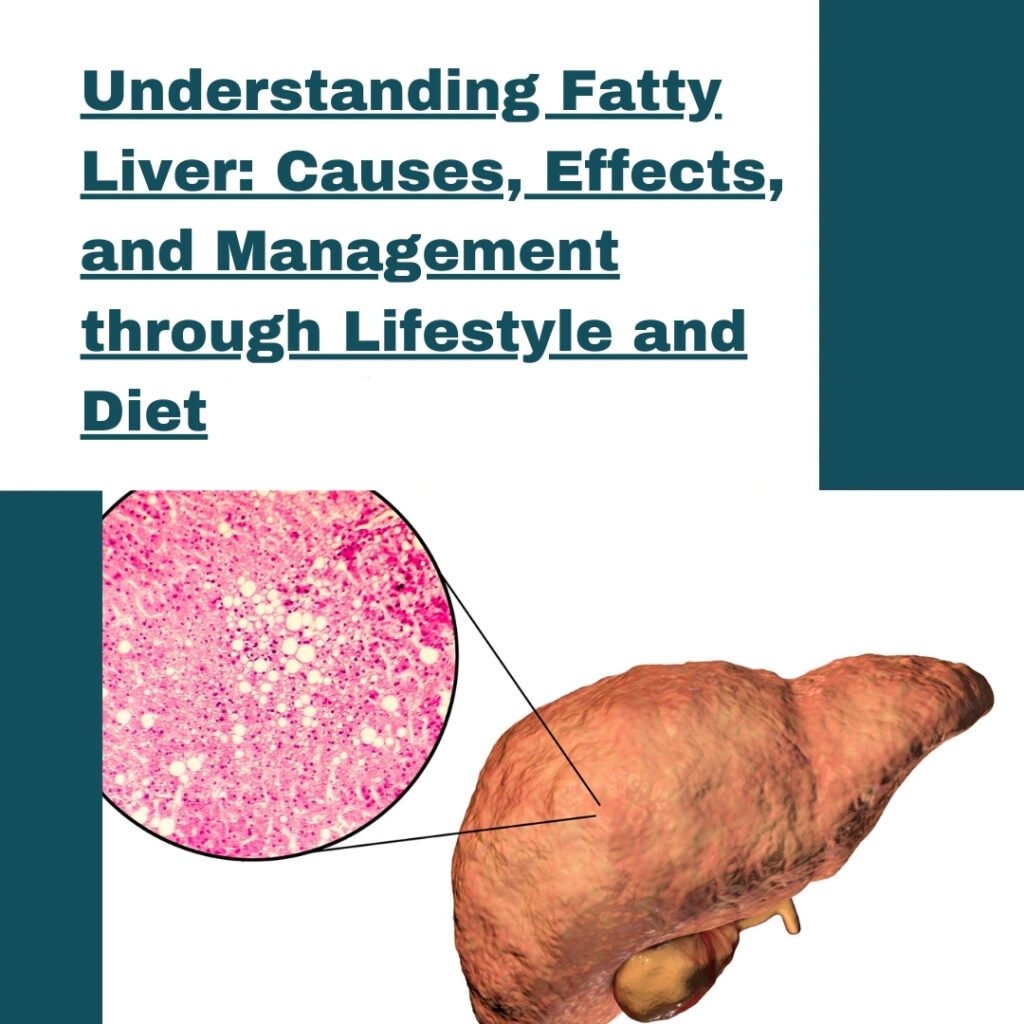Fatty liver disease, also known as non-alcoholic fatty liver disease (NAFLD), is a condition where excess fat accumulates in the liver without alcohol consumption. This accumulation of fat can affect liver function and lead to complications like inflammation, scarring, and in more severe cases, cirrhosis or liver failure. With a rise in lifestyle-related diseases, fatty liver has become one of the most common liver conditions, especially in urban populations.
Causes and Risk Factors of Fatty Liver Disease
Fatty liver disease typically results from an imbalance between the accumulation and breakdown of fats in the liver. Several factors contribute to this imbalance:
- Obesity: Excess body fat, particularly around the abdomen, is a leading cause.
- Diabetes and Insulin Resistance: People with Type 2 diabetes or those with insulin resistance are at an increased risk.
- High Cholesterol and Triglycerides: Elevated levels of these fats in the blood are closely linked to fatty liver.
- Poor Diet: Diets rich in unhealthy fats, sugar, and processed foods contribute to fat accumulation in the liver.
- Sedentary Lifestyle: Physical inactivity leads to weight gain and worsens insulin resistance.
- Genetics: Family history can increase susceptibility to fatty liver.
- Other Factors: High blood pressure, certain medications, and sleep apnea are also linked to fatty liver.
Scientific Insights into Fatty Liver Disease
The liver plays a critical role in metabolizing fats and detoxifying the body. In fatty liver, excess fat, primarily in the form of triglycerides, accumulates in liver cells, leading to inflammation. This can cause the liver to become enlarged, and if left untreated, the liver tissue may undergo fibrosis (scarring) and eventually cirrhosis.
Fatty liver disease is often asymptomatic, meaning many individuals may not experience noticeable symptoms until the condition is more advanced. However, in some cases, it can cause fatigue, discomfort in the upper right abdomen, and jaundice in severe stages.
Management of Fatty Liver through Lifestyle Changes
While fatty liver disease is concerning, it is manageable and even reversible, especially in its early stages. Lifestyle and dietary modifications play a crucial role in managing and improving liver health.
1. Weight Loss
Achieving and maintaining a healthy weight is one of the most effective ways to reverse fatty liver. Studies have shown that losing 5-10% of body weight can significantly reduce liver fat and improve liver function. Weight loss helps reduce fat accumulation in the liver, enhances insulin sensitivity, and lowers inflammation.
2. Exercise Regularly
A sedentary lifestyle exacerbates fatty liver, so incorporating regular physical activity is essential. Aerobic exercise, strength training, and high-intensity interval training (HIIT) have shown to help reduce liver fat, improve insulin resistance, and support overall health. Aim for at least 150 minutes of moderate exercise or 75 minutes of vigorous activity per week.
3. Balanced Diet
The role of diet in managing fatty liver cannot be overstated. A well-balanced diet can prevent fat buildup and reduce inflammation in the liver. The following dietary changes can be beneficial:
- Increase Fiber Intake: Foods high in fiber, such as whole grains, fruits, and vegetables, promote healthy digestion and help reduce fat in the liver.
- Limit Saturated Fats and Sugars: Reducing the intake of fried foods, processed meats, and sugary snacks can lower triglycerides and prevent liver fat accumulation.
- Focus on Healthy Fats: Replace unhealthy fats with healthy monounsaturated and polyunsaturated fats found in foods like olive oil, avocados, and fatty fish (salmon, sardines). These fats have anti-inflammatory properties and can help improve liver health.
- Eat More Antioxidant-Rich Foods: Include foods rich in antioxidants, like berries, nuts, and green leafy vegetables, as they protect liver cells from damage and reduce inflammation.
- Moderate Carbohydrate Intake: Excess carbohydrates, especially refined ones (like white bread and sugary foods), can increase fat accumulation in the liver. Opt for whole grains like brown rice, quinoa, and oats.
- Drink Plenty of Water: Staying hydrated supports liver detoxification and helps maintain healthy liver function.
4. Avoid Alcohol and Toxins
Although fatty liver disease is not directly caused by alcohol, consuming alcohol can exacerbate liver damage and inflammation. Limiting or eliminating alcohol consumption is essential to protect the liver. Avoiding toxins like environmental pollutants and harmful chemicals is equally important for liver health.
5. Manage Comorbidities
Controlling underlying conditions such as diabetes, high blood pressure, and high cholesterol can prevent the progression of fatty liver disease. Regular check-ups and medication management are crucial in maintaining overall health and supporting liver function.
Seeking Professional Guidance: The Role of a Dietitian
Managing fatty liver disease can be complex, and personalized guidance is often necessary. Consulting a best dietician in Noida or your local area can help tailor a diet plan specific to your needs and health conditions. A dietitian can provide expert advice on nutrient-rich foods, portion control, and lifestyle modifications to help you achieve optimal liver health.
The best dietician in Noida will offer:
- Personalized Meal Plans: Based on your body composition, medical history, and preferences, helping you achieve weight loss and liver health goals.
- Nutritional Education: Understanding the best foods for liver health and how to incorporate them into daily meals.
- Monitoring and Support: Continuous support to track progress and make necessary adjustments to your diet and exercise routine.
Conclusion
Fatty liver disease is a growing concern, but with proper lifestyle changes and dietary modifications, it can be managed effectively. Focusing on weight loss, regular physical activity, and a balanced diet are foundational to improving liver health. Seeking the guidance of a professional, such as the best dietician in Noida, can help ensure that you follow a targeted and sustainable approach to managing fatty liver. Early intervention, commitment to lifestyle changes, and regular medical monitoring can help prevent complications and improve quality of life.


